ProJo reports that RIPTA is once again, in a now annual tradition, looking at fare hikes and service cuts to balance their budget deficit.
John Rupp, the board chairman, said it will try to design a fare increase that won’t deny people transportation, and it will try to keep any service adjustments from doing more than inconvenience riders.
“We’re trying to target a fare increase that won’t push people off the bus,” he said.
Good luck with that, you raise fares and you reduce service, you’re pushing people off the bus. If I can’t get there from here, then I won’t.
The fare increase sought is $0.25, which would raise fares to $2.00. The chairman claims that will keep RIPTA’s fares inline with other agencies. Actually, if you look just up the road to Boston, you’ll find bus fares between $1.25 and $1.50 depending on which fare product you use. In Austin, Texas (a city with a similar metro size to us) bus fares are $1.00.
Where Austin and Boston both differ from Rhode Island is that they both have express bus services with higher fares than local service. Boston has express bus service costing $2.80 to $5.00 depending how far you go and which fare product you use. Austin’s express bus service costs $2.50. Here in Rhode Island you can travel a route such as the 40, which doesn’t leave the city of Providence, or the 60 which runs all the way from Providence to Newport, or the 54 Express which runs from Providence to the Lincoln Mall non-stop, all for $1.75 ($2.00 if the increase goes through). These are different kinds of service, but they are all treated the same when it comes to the fare charged.
In Boston, express buses have local and express zones. Take the 553 which I used to ride when I lived in Waltham. The 553 starts at Brandeis University, goes through Waltham Center, West Newton, Newtonville, and Newton Corner where it gets on the Mass Pike and runs Express into Boston. If one were to ride the bus between any two points between Brandeis and Newton Corner, one would pay the local fare, if one stays on the bus into Boston, then they must pay the express fare. So the bus provides local service at it’s far end, but a premium is paid if you want to utilize it all the way into the city. A zone structure like this could be instituted on a bus such as the 60 to Newport. One would pay a local fare if they didn’t leave Aquidneck Island for example, or perhaps a local fare zone all the way to Barrington. But if you wanted to ride all the way into Providence, a higher fare would be instituted. Or there could be another version of the 60, a 60 Limited, which would not stop at every stop, thereby speeding the trip and justifying a premium fare.
RIPTA provides various kinds of services but treats them all the same. There is local urban bus service which people use as their primary means of transportation in Providence and Pawtucket and to a lesser extent in the close suburbs and out in Newport. Then there are commuter services, whereby people are parking their cars and getting on the bus to get to jobs in Providence. And there is some reverse commuting where people are taking buses out of Providence to jobs at office parks in the suburbs. And the service that RIPTA is probably least good at, due to it’s hub-and-spoke arrangement, where people are taking the bus from suburb to suburb.
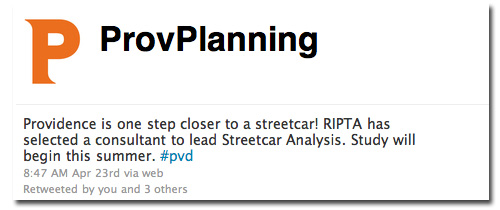
As RIPTA looks towards the future and starts to plan for things such as Streetcars, rapid bus service, more park n’ ride facilities, integrating service with southward expansion of commuter rail, and more, they need to start considering what are the different services they are providing, how they will be operated and prioritized, and what fares are reasonable for each.
Of course the reason for RITPA’s current budget problem is the same as it always is, the gas tax:
The situation is another in a series of fiscal crunches for the authority. It reflects a continuing paradox: as expenses rise, the revenue from a key revenue source, the state fuel tax, is fading. Also, the more successful the authority is at persuading drivers to take the bus, the less fuel they buy and the less money the transit agency gets. The same is true whenever gas consumption declines. The fuel tax is linked to the number of gallons sold rather than to the price.
There are some working to free RIPTA from the gas tax Catch-22 it is trapped in now. The Coalition for Transportation Choices (CTC) is supporting a legislative package that will help RIPTA free itself from dependance on the gas tax and help RIDOT from depending so much on issuing bonds to make the money they need to match federal dollars.
The CTC supports an increase in the biannual auto registration fee to $40, a Petroleum Products Gross Receipts Tax, and a Vehicle Miles Traveled (VMT) tax. The VMT would be studied this year before moving to implement it, the registration fee and Petroleum Products Gross Receipts Tax could go in to effect now and raise $67 million annually for RIDOT, RIPTA, and local cities and towns to repair roads.
Year after year after year after year we end up here. RIPTA saying they don’t have enough money and have to cut service and raise fares. And Year after year after year after year the Assembly does nothing to change the fact that it is the gas tax trap that is causing this.
Insanity: doing the same thing over and over again and expecting different results.
Let’s stop being insane.
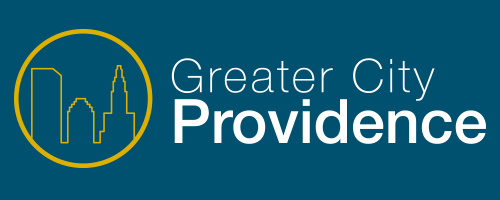
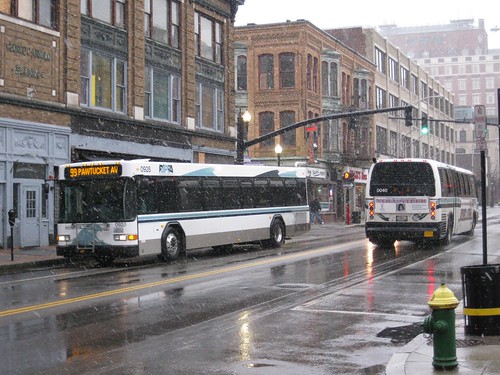
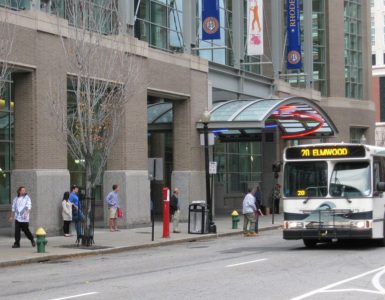
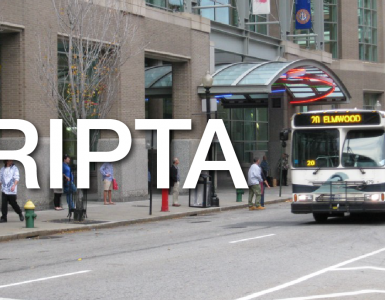


It’s also true that both Massachusetts and (especially) Texas are much larger states, with populations that are generally less urban than ours. It’s a lot easier for them to funnel resources and tax dollars from those areas into a handful of urban centers, or in the case of Boston, a single major city. Without as much territory to draw from, we have to work that much harder to make the system function correctly.
A woman who works with my wife (might even be her boss) takes the bus from Narragansett to Providence everyday. It amazes me that she pays the same fare as my wife who takes the bus from one side of Providence to the other (I’m purposely leaving out the fact that this is at Brown where they get to ride for free, but Brown pays for that).
What RIPTA needs to do is charge different fares for routes that go express to other parts of the state. Routes like the airport express should cost more. There’s no reason they don’t. They would eliminate many of their problems if they changed that. They should also change the way they do the UPass thing. Let the college ID give you free transportation within Providence and the immediate surrounding areas, but have it only give a discount (50% maybe) on the routes that go elsewhere in the state and the express routes. The same thing should go for the other people who get to ride for free right now.
The gas tax will always be a problem. As Corey said, we’re a much smaller state with far fewer people living in suburban and rural areas than MA or TX. We make less on the gas tax than they do. But that’s why the state should re-think how it funds RIPTA. It shouldn’t be solely from the gas tax (which also, supposedly, goes towards roads).
Capital Metro in Austin is largely funded by a 1% sales tax leveed in the communities served by the agency. It gets some statewide funding, but more than 70% of their revenue is from the local sales tax.
Of course with the economy we are in now, sales tax receipts have dropped and Capital Metro has had budget issues as a result. Their current $1.00 fare is the result of a fare increase from $0.75.
Fiscal 2010 budget [.pdf]
Honestly, having express lines would be much more attractive for those who work on one side of the state versus where they live. I live in Providence, but I work in Newport. At one point, I took the bus to work for reasons as I was temporarily without car. The #60 is unbearably long. Dealing with all those stops along 114 in Warren and in Bristol…then again in Middletown makes the line neverending.
It takes me a mere 40 minutes by car direct. The bus took well over the 1hr/10min that RIPTA’s schedule prescribes. Add to that, traffic in Warren and Bristol and heavy congestion on 114 in Middletown/Portsmouth.
If there would be a direct line without all those stops, I’d be interested.
If you go back a few years (Mid 1990’s) you recall that RIPTA had a tiered fee structure. It cost more to go Providence to Newport than it did Providence to Pawtucket, etc.
Problem was, RIPTA at that time sucked at letting people know what the zones actually were. If you were a long time user of the system you got to know them but they weren’t really published anywhere.
Around 1997 or so when Beverly Scott came in they standardized on the flat rate of $1.25
As far as VMT goes – I know why they’re studying that. You’re about to see electric vehicles on the road. Plus you’re starting to see vehicles with MPG over 40. That means less or no gas being used. No gas purchase, no tax collected. And I have to look at the motor vehicle code, ah here it is § 31-1-3(d). A motor vehicle is defined as “(d) “Automobile” means, for registration purposes, every motor vehicle carrying passengers other than for hire.”
They don’t explicitly mention what the motive force is so you still have to register an electric car. Oh well.
After 3 years here, I’m still amazed there isn’t a tiered system. I came from Pittsburgh, where the transit authority is also predominantly structured hub and spoke, but there are 3 transit zones. Fare collection is done at time of exit and fare is based on the current zone for outbound trips, and at boarding for inbound. I’m not sure if there’s an “intra-zone” fare for people not leaving the zone they’ve boarded in. There’ also a “free” zone in the core of the downtown to facilitate people moving around. But to make it worthwhile to pay more, there really be express services to trim the time on that #60 to below and hour, or some of the other longer trips.
Raising the fares will hurt and eliminate some riders, but if there’s a benefit to be gained at the same time…
One reason RIPTA gave when they ended zone fares was that the number of long distance passengers was so small the extra revenue was negligible. It was hoped the lower fare would entice more long distance riders because the pollution reduction is greatest when lengthy car trips are foregone.
I think J Bouchard’s tale (#4) is highly representative. His or her decision would not change even if the fare were $0.00. The lesson is that comfort and convenience, not price, is keeping commuters in their cars.
Price is a much bigger consideration for the vast majority of the ridership, the people in the cities. Bring back zone fares.
The only problem with collecting the fare at the end of the trip is what happens if the rider doesn’t have any money or a fare card? When you pay upon boarding, you’re forced to pay. If you don’t pay, you’re not allowed on. It’s much easier to enforce it that way.
RIPTA should most definitely have transit zones. Make Providence and Pawtucket/CF one zone, and then the surrounding cities (NP, EP, Cranston, Warwick, Johnston) a second zone, and then the rest of the state can be a third zone. Then for routes that originate and stay in the other cities, have them be that lower fare for the first zone (Newport, Westerly, Woonsocket, Pawtucket/CF)
I’d like to move back to a tiered system, but only two tiers: ‘Greater Providence’ and ‘Everything Else’. Enforcement is an issue, I recall it being a problem back when we had a tiered system. Express lines would be great for Park and Rides and the suburbs, or other hubs. A morning bus that swept Boston commuters from Providence, Pawtucket, and Cumberland and delivered them to South Attleboro station would be pretty cool.
What about cutting costs without cutting lines and raising fares? Are there options to schedule drivers better to reduce the number of folks on payroll? What about renegotiating the contracts? I heard the maintenance situation (the cost of the garage) is way out of control.
I think if RIPTA made a big effort to appear fiscally responsible, they’d have a better shot at funding from the state and private sources. I’m not asking for a for-profit or zero-net-impact public transit system (I’d like to see fares at $1), but there’s a suspicion amongst a lot of us that no matter how much funding they get, they’ll always come back with pockets inside-out, threatening a service cut.
Tying RIPTA to the gas tax is clearly a mistake. Tying -anything- to the gas tax is a mistake, it’s a volatile number.
I’ve always thought that the fuel tax should be a percentage, not a set amount per gallon, that way, as the price of fuel rose, the actual per gallon collection would rise. This still isn’t a good fix for when overall consumption goes down, but it seems better than the current formula.
Andrew- I’m going to guess ridership in general was lower back then. We’re talking like 15 years ago when Providence wasn’t quite as popular as a place as it is now. More people come into the city now. And, honestly, what difference does it make if it was negligible? They should be getting what they deserve to get. It costs more to run a bus that far than it does within the city.
Often poorer populations are located within the urban core. For those commuters limiting the amount of a fare increase is critical. For distant commuters it’s more about comfort and convenience rather than price, as long as the roundtrip price is lower than the daily parking rate in the city. The 60 from Newport to Providence is a tough ride with trip time and seat hardness.
Returning to a two tiered fare system with the addition of higher priced express-buses could help reduce the budget gap. It would be fairer with people paying for the extra distance they travel. A revenue source other than the gas tax would be ideal or the gas tax should be calculated by percentage as mentioned. No one’s focusing on the likelihood that when the worldwide economy recovers oil prices will skyrocket again, which would result in less income from the tax due to lower car usage, plus the strain it would place on the transit system with increased ridership.
ProJo: RIPTA board votes on fare increase.
Commenters on ProJo scream bloody murder about “free” rides.
Did anyone see that movie “Groundhog Day?”
On the good news front, between the Coalition for Transportation Choices, Transit 2020, and RIPTA’s Strategic Planning Committee, the appears to positive movement on the formation new policies that, if implemented, will hopefully correct the funding problem.
The question will be once these policies are determined, will the general assembly have enough political will to enact them. The below study by RIPEC was published in 2002 and details the transportations funding issues that are still faced today, so it’s not like anyone should be surprised that RIPTA faces structural deficits. In fact, in spite of this, RIPTA has done a great job growing ridership and keeping their budget as manageable as they have. In addition, I hope the gas tax increase that passed last year to fund RIPTA did not burn a lot of bridges that prevents these funding changes from happening.
http://www.ripec.com/matriarch/d.asp?PageID=66&PageName2=pdfsdoc&p=&PageName=crossroads%2Epdf